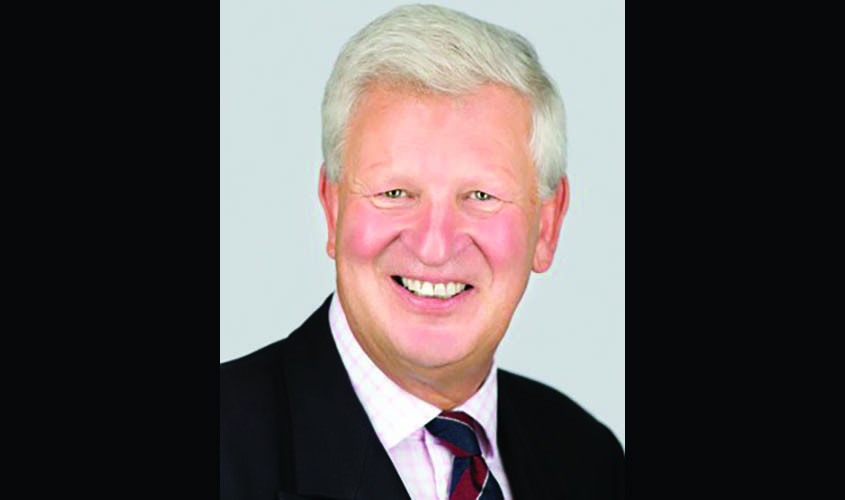ISIS’ ideas of a caliphate, based on holding territory, are about to be extinguished by their military defeat in Raqqa and Mosul. But just as the conflicts in Iraq and Syria are about to enter a new phase, a new-ish intra-GCC squabble threatens to make the regional situation even more complicated, if that was possible. So says Lieutenant General Sir Simon Mayall, former Middle East adviser at the Ministry of Defence. The following are Sir Simon’s insights, as told to this reporter, into a situation he has watched develop over the past 15 years.
The concerning factor is the increasingly public competition for a leading position in the Middle East between two GCC nations, Saudi Arabia (SA) and Qatar. SA regards itself as the “big brother” and the boss of the region and, with it guardianship of the two holy cities, SA has traditionally seen itself as having the leadership role in the Arab world. However, in the past 20 years Qatar has emerged as an independent, albeit much smaller, challenger of this position, a confidence that has grown on the back of its astonishing gas wealth. Today SA’s demands for Qatar to relinquish its regional ambitions, supported by the UAE, Bahrain and Egypt, are very explicit, the exchanges have been very public and the language used by the Al Saud and Al Thani leadership is very personal, making it very difficult for either side to back down. This confrontation could not be happening at a worse time, as it coincides with Iranians, Turks, Arabs and Kurds all competing for control in that region, as ISIS is driven out.
Sir Simon has been watching this latest confrontation grow out seeds planted in the 1990s, but which were exacerbated by the events of the “Arab Spring”. In the 1980s SA’s support for the mujahideen in Afghanistan fuelled the rise of Al Qa’eda, although in time SA itself became the primary target of AQ. SA were late to recognise, but then began to take measures against this movement, even where it ran up against their close alliance with the Wahhabists. Therefore, while the state began to withdraw its support, Wahhabism, with its fundamentalist interpretation of Islam, continued to be exported through privately funded “charitable institutions”, a number of which had extremist, even terrorist links. This was revealed in this week’s report from the Henry Jackson Society entitled “Foreign Funded Islamist Extremism in the UK”, which is believed to reach similar conclusions to the report that David Cameron instigated in 2015 to reveal the influence and activities of the Muslim Brotherhood, which has yet to be published in full.
Qatar has also featured in the report for its very pro-Muslim Brotherhood line. Since Emir Hamad bin Khalifa overthrew his father Sheikh Khalifa bin Hamad in 1995, the Al Thani-Al Saud relations have been strained. The former Emir, and his wife Sheikha Moza, pursued an ambitious programme of reform and development in the country, also seeking to raise its global profile, in which the broadcaster Al Jazeera (AJ) has played an important part. AJ English was perceived by the West as a refreshing take on Middle Eastern affairs, but its editorial line and its reporting often offended other GCC States. AJ Arabic’s espousal of free speech had a much more radical tone, with its emphasis on youth, support for Islamist groups, and criticism of neighbours, including other GCC members. This all came to a head in 2011, when Egypt erupted, and Qatar aligned herself with president Morsi and the Muslim Brotherhood government. Qatar subsequently intervened in Libya and Syria on the side of the more Islamist opposition groups, further distancing themselves from GCC members, most notably SA and UAE.
In 2013, SA withdrew their ambassador from Doha, and King Abdullah summoned the new Emir, Tameem bin Hamad al Thani, to Riyadh to reprimand him for the activism Qatar was demonstrating in the region and for their support of the Muslim Brotherhood. At that time the Emir of Kuwait Ahmed bin Sabah Al-Sabah mediated a role he is reprising in the current crisis. At this stage it looked like normal service had been resumed and the GCC states were once more aligned.
Recent events have proved that hope to be misplaced, the same issues have re-surfaced but this time in a more virulent manner and the stakes are much higher. King Abdullah is dead and Barack Obama is no longer President. Crown Prince Mohammad bin Salman, de facto leader of SA, appears to have been emboldened by President Donald Trump to stamp on Qatari pretensions once and for all, giving an ultimatum that looks to be impossible to accept
The stability of the GCC is vital to the world’s economy. The Middle East sits on about 50% of global oil and gas reserves, and guaranteed access to these energy resources, at a reasonable price, is essential for the world’s economy. Measured diplomacy is critical during this time, and all governments, not least the US, should be doing all they can to defuse this stand-off.
Lieutenant General (retired) Sir Simon Mayall, KBE, CB is an authority on Gulf affairs, with a distinguished career in the British military that culminated in his appointment as Defence Senior Adviser (Middle East) from 2011-2014.

